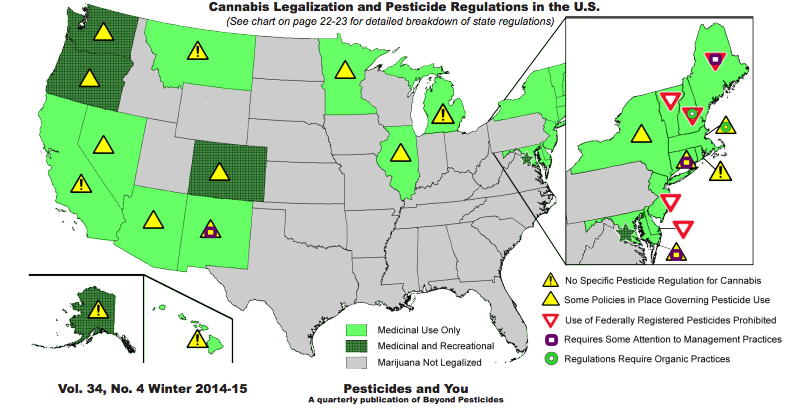The Problem Plaguing Marijuana Legalization

By:
Recreational and medical marijuana states are starting to figure out how to regulate and tax weed, but they're now facing a serious problem, one with no clear solution: Pesticides. The presence of such chemicals on marijuana could be a problem for patients using it for medical purposes, and they could prove harmful even to recreational users.
Sarah Zhang of Wired reported that pesticides used by marijuana farmers are on track to become the industry's next major problem. Consider:
- Twenty-five states and the District of Columbia have legalized some form of marijuana use.
- Of those, six states entirely forgo regulation of pesticide use on marijuana plants.
- Five states prohibit all pesticide use on marijuana plants or allow innocuous pesticides such as rosemary oil and garlic.
- The remaining states, as pictured below, combine some version of the aforementioned regulatory measures, either prohibiting federally registered pesticides or requiring states to pay extra special attention to management practices.
 Beyond Pesticides - beyondpesticides.org
Beyond Pesticides - beyondpesticides.org
What are pesticides and why should we be worried about them?
Pesticides present a difficult issue in the world of agriculture. Farmers require pesticides to protect crops from destruction by various pests and disease carriers, including weeds and insects. But pesticides could potentially harm the health of people who ingest these agricultural products.
Even in low doses, chronic pesticide ingestion by humans has been liked to respiratory issues, memory issues, and birth defects, among a wide variety of other serious ailments, according to a University of Washington study on the health risks of pesticides in food.
Why are they sprayed on marijuana plants?
There are a number of pests, bugs, and maladies to which marijuana plants are prone. If farmers fail to deal with them, they could suffer big losses: A single mature marijuana plant, according to Wired, can be worth up to $4,000.
Pesticides have long been subject to regulation — just ask the Environmental Protection Agency, which has been scrutinizing their use since the 1970s.
The problem with marijuana is that the federal government, unlike many states, still considers marijuana an illegal drug: The Drug Enforcement Administration still classifies marijuana as a Schedule 1 controlled substance. This means it's considered a dangerous drug with no medical value and a high potential for abuse. As a federal agency, the EPA is limited in how it can regulate the use of pesticides on marijuana plants, Wired reported.
But aren't pesticides sprayed on food, too?
Farmers have been protecting their valued crops through artificial means since the days of ancient Rome, when they burned sulfur, according to an academic paper by the Integrated Pest Management program at North Carolina State University. Today's pesticides are poisons and can be risky or harmful to use. Whether and how to use pesticides boils down to weighing the risks of use against the benefits, which can prove difficult, since risks and benefits aren't measured using the same currency, the researchers argued.
"Benefits are usually measured in economic terms, whereas risks are measured in terms of human and environmental health," according to the study.
The difference between how food and marijuana are consumed sheds light on why pesticide use on marijuana plants is problematic. Marijuana can be eaten like food, but many users consume it through smoking. The EPA previously investigated pesticide use on tobacco plants; its report said that "absorption from the lungs is usually very rapid, often equivalent to IV injections," Wired said.
Why not regulate pesticide use on marijuana plants like it's regulated on tobacco plants?
Marijuana and tobacco slightly resemble each other, and both plants are often smoked, but they are two very different entities. Tobacco falls into a sort of gray area with the Food and Drug Administration: It doesn't approve of farmers using any pesticides on the plant, but it also fails to restrict pesticide residue on tobacco plants as it does for other food crops.
So why isn't anyone ringing alarms on the EPA's laxness when it comes to tobacco? Tobacco itself already contains many harmful chemicals; any pesticide residue would be only a part of that mix, Wired reported.
But marijuana is different: People may use it medicinally. "When it comes to growing cannabis for sick patients, regulators can't be so cavalier about pesticide residue," Wired reported.
What steps should regulators take?
Put simply, creating comprehensive regulations for marijuana pesticide use would be complicated and costly, because the current tests used to screen for pesticide residue aren't cheap, according to Wired.
In the absence of federal regulation, how do states deal with the problem?
- Oregon, a state that legalized marijuana for recreational use, will require marijuana products starting Oct. 1 to undergo a battery of tests for dozens of pesticides, among other contaminants, before they hit dispensary shelves.
- Colorado, the leader of the marijuana legalization movement, doesn't require any regular tests for pesticides on marijuana plants, The Oregonian reported.
Alex Hoggan, who runs ChemHistory, a marijuana-testing lab based out of Milwaukie, Oregon, told The Oregonian:
"It's really hard to find clean cannabis at the moment. If we were testing to the new [recreational] law, which we will be doing in a couple months, there will be a lot of fails. I mean, a lot. The question is: Have the growers had enough time to figure out their pesticide use?"
